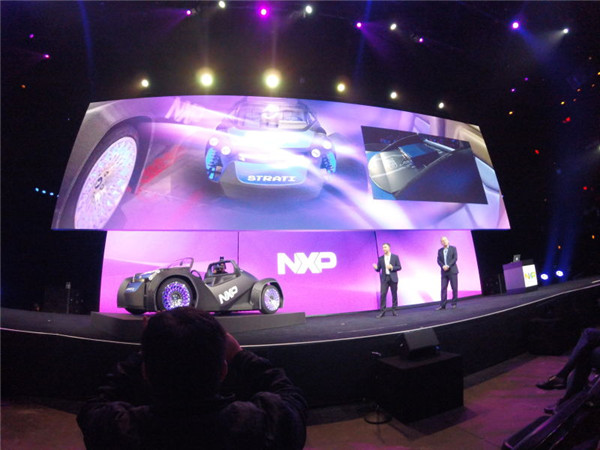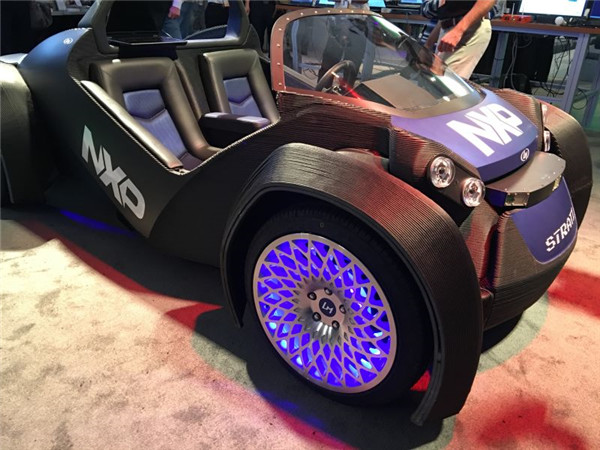 |
|
LocalMotors' 3D printed car that equipped with NXP's brand new "BlueBox" autonomous vehicle computing system is displayed on May 17, 2016 at the NXPFTF Americas 2016 held in Austin, the United States. [Photo by Liu Zheng/chinadaily.com.cn] |
Autonomous driving has caught the imagination of China as tech companies, EV makers and traditional automakers rush to invest in the market.
During the ongoing technology forum NXPFTF Americas 2016, which started on Monday, the organizer, Dutch-based NXP Semiconductors has been demonstrating a brand new autonomous vehicle platform powered by its central computing engine, BlueBox.
In the open autonomous vehicles systems, multiple streams of sensor data are routed to the BlueBox engine, where they are fused to create a complete 360 degree world model around the vehicle, and by introducing BlueBox, the company has rolled out a complete portfolio for self-driving robots.
According to the company, this functionality greatly improves car safety by both managing and preventing emergency situations.
Unlike closed systems focused only on vision or other single-sensor data streams, BlueBox is an open-platform, Linux-based solution programmable in linear C language that automotive manufacturers can easily customize to their needs for optimal product differentiation.
 |
|
LocalMotors' 3D printed car that equipped with NXP's brand new "BlueBox" autonomous vehicle computing system is displayed on May 17, 2016 at the NXPFTF Americas 2016 held in Austin, the United States. [Photo by Liu Zheng/chinadaily.com.cn] |
"BlueBox and its connected secure smart solutions also incorporate the embedded intelligence and machine learning required for complete situational assessments, supporting advanced classification tasks, object detection, localization, mapping and vehicle driving decisions," said the company.
"We are optimistic about the opportunities for automobile growth in China as the expansion of the middle class in the country has created the need for transportation and vehicles," Rick Clemmer, president and CEO of NXP told China Daily during the event. "The key is going to be how we can facilitate handling the increased number of cars with the same infrastructure that is associated with it."
According to Clemmer, NXP aims to demonstrate some of the smart city technologies to China to see how they can be deployed to relieve traffic congestion given the increasing number of cars.
Currently the product has been tested and is already available to customers at four of the world's top five automobile makers.
NXP has closed a $11.8 billion deal to purchase Austin-based automotive microprocessors Freescale, and the combination has helped NXP displace Japan's Renesas as the world's largest vehicle chipmaker.
The company is also a world leader in advanced driver assistance system (ADAS) processors, having shipped more than 30 million ADAS processors worldwide to date. Eight of the world’s top 10 largest carmakers use ADAS processors from NXP.
According to market watcher Semicast Research, NXP has reached 14 percent of the global market share in the automobile semiconductor sector in 2015, up one percent year-on-year, ranking first around the world and also in specific markets including China, North America and Europe.
A survey by Boston Consulting Group in April last year also showed that China will soon corner more than 25 percent of the driverless car market, which is expected to hit 12 million units globally by 2035.
Roland Berger, a global strategy consultancy, recently said that Chinese car owners are much more open to unmanned cars than Europeans and people in the US.
As many as 96 percent of Chinese drivers stating that they would consider an autonomous vehicle for almost all everyday driving, whereas in the US and Germany, the figure was 58 percent.
According to Waidy Chan, General Manager of Automobile Business Unit of NXP's Great China Region, various driving tests are being planned or conducted to verify the reliability of fully autonomous cars in the country in recent years.
"We do see high potential in China for the autonomous vehicle market," said Chan. "We will focus on leading opportunities and proactively drive the ADAS solution and bring our experience and know-how into the China market in order to help local customers and partners on the development of ADAS solution focusing on Radar and vehicle to vehicle and vehicle to infrastructure (V2X) technologies, security elements, processing and analog capability."
In late November last year, NXP took part in the Shanghai smart connected car pilot program to jointly launch the world's first energy-positive solar-powered family car named Stella Lux.
The car also comes with various V2X secure connected technologies and micro-controllers supplied by the semiconductor maker.
Chinese domestic technology companies and auto enterprises have also shown their interest in developing autonomous vehicles and some of them have already made outstanding progress.
In April, Chinese internet company LeEco Holdings Ltd launched its concept car LeSEE, jointly built with US auto manufacturer Faraday Future. Its driverless technology was showcased during the launch.
Baidu Inc last week unveiled a five-year plan, aiming at letting driverless cars range freely around one of China's Eastern cities, Wuhu.
Wang Jing, head of the company's driverless vehicle arm, told media that Wuhu wants to be the first city in the world to embrace autonomous driving.
The company is currently unavailable for comment on whether it will work closely with NXP on implementing the new connected-car solution in their driverless vehicles.
